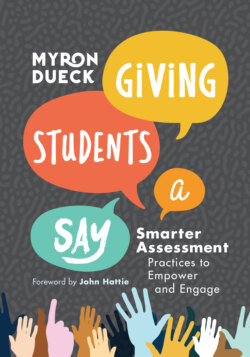Читать книгу Giving Students a Say - Myron Dueck - Страница 29
На сайте Литреса книга снята с продажи.
Student-Created Targets
ОглавлениеI don't know why it didn't dawn on me years ago to give students more voice and agency in creating learning targets. There were indications that students had something to offer in this area; apparently, I was either not listening or not ready to give up the steering wheel. Consider the following experience around retesting, for example—one I cited in Grading Smarter, Not Harder.
I had a student, Sam (a pseudonym), who had made one tiny error on our unit test on the Paris Peace Conference and had lightheartedly demanded a retest, cheekily muttering that there was nothing I could ask him that he didn't know about our unit. "Just give me my inevitable 100 percent," he said. In reaction, I made his "retest" an interesting mission. He needed to find out something about our unit that I (1) didn't know and (2) would find intriguing. Furthermore, he needed to tell me when he was ready, and I'd choose the time and place for him to present his findings.
"How am I supposed to know what you'd find intriguing?" he asked with some frustration.
"I guess we'll just have to find out now, won't we?" I responded.
As frustration instantly switched to ardent determination, he stomped out of the room exclaiming, "OK, Dueck, it's on!"
A few days later, Sam came to class early and was excited to tell me what he had discovered. When he was about to launch into his diatribe, I reminded him of the third element of the "retest": I would choose the time and place.
"I didn't think you were serious about that!" he said with exasperation.
"Oh, I was serious," I responded. "I want to be sure you really know it."
Several days passed before I came across Sam at a local hardware store and promptly ambushed him.
Setting down a box of nails, he asked, "Hey, Mr. Dueck, why don't you address the topic of Class C Mandates in our unit?"
"Class C Mandates? I haven't heard of them." I answered.
With a wry grin, Sam retorted, "Ah! Intrigued, are you?"
Sam went on to share an in-depth account of groups of people that the leading powers of 1919 thought to be incapable of ever ruling themselves—most of which were African colonies that are independent countries today. I was intrigued.
For the longest time, I looked at this story through the lens of retesting, but not cocreating learning targets. Clearly, Sam had developed a personal interest that was aligned with our topic of study, but on a matter that I had not included. In hindsight, I've had students explore personal-interest areas in project work, but for some reason, I've not extended this opportunity in a more formal way to delve into cocreating targets. It's time to change that.
Implication for assessment: Note in Figure 2.2 that it's relatively simple to modify my original unit plan to include student voice and choice. Students can write their own learning targets by completing the "I can" statement. They simply select a verb and then insert the content material that will accompany it. Here are examples of learning targets that reflect actual student interests from my class and that could have been transformed into learning targets aligned to existing standards:
I can explore (verb) the training and tactics of a specific WWII tank ace (Michael Wittmann). (B.C. Standard: "Examine the role of technology in major conflicts.")
I can determine (verb) the extent to which landmines have had a detrimental impact on elephant populations. (B.C. Standard: "Assess the short- and long-term causes and expected and unexpected consequences of people's actions, events, phenomena, ideas, or developments [cause and consequence])."
If you adhere to the Next Generation Science Standards, a student could create the following target:
I can create (verb) a model using plastic parachute figures to indicate the force of Earth's gravitational pull. (NGSS 5-PS2-1: "Support an argument that the gravitational force exerted by Earth on objects is directed down.")
Allowing students to create their own targets is not a far stretch from offering them choice on inquiry projects. Overtly providing these opportunities simply underscores our elevator pitch.
